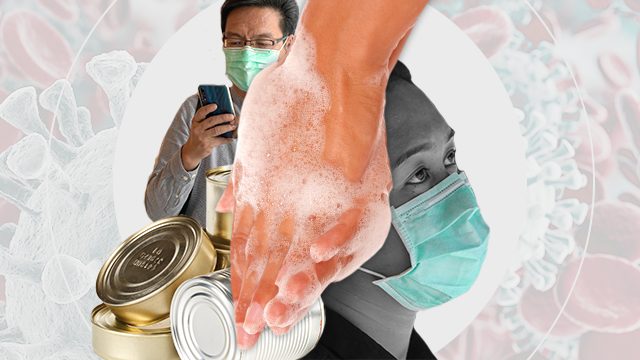SUMMARY
This is AI generated summarization, which may have errors. For context, always refer to the full article.

The global spread of coronavirus isn’t showing signs of slowing down any time soon. Because of that – sure – it is tempting to be selfish and it is easy to feel powerless.
In the Philippines, as soon as the cases of confirmed coronavirus rose, lines in grocery stores also marked up. People hoarded canned goods, water, bread, and even tissue – in a country where using tabo, or dipper, is more culturally-accepted. Worse, some Filipinos dared to resell their surplus stocks at jacked-up prices.
Health experts of course frowned upon the sudden panic buying while government officials rightly vowed to punish those who will try to make gains over this medical emergency.
Currently, scientists and government leaders are working hand-in-hand on the frontlines to contain this pandemic. But anyone can be part of the solution. There are simple, selfless, and rational things that we can all practice and do to contribute to this shared goal. .
Practice basic good hygiene
The widely known fact is that washing hands and social-distancing can reduce one’s risk of contracting the coronavirus. That is correct, but there is also a utilitarian reason behind these personal preventive measures.
The worst form of this pandemic will affect everyone differently and some are more at risk than others. Not everyone can work from home or avoid crowds during the daily grind of commuting. If you’re healthy and privileged enough, there’s a big chance that you either won’t contract the disease or just experience a mild case.
Why then should you bother washing hands regularly?
Researchers argued that the simple act of maintaining the hands clean can significantly “flatten the curve” – as how many experts put it – or throw the coronavirus into a slow motion.
Specifically in airports, if 60% rather than 20% of the travelers regularly washed their hands, it could slow down the spread of infections by almost 70%.
The more healthy people practicing these preventive health measures, the less likely old and immunocompromised individuals will be sick. Therefore, the fewer serious cases in hospitals would also mean less pressure in our healthcare system.
In the long run, these positive ripple effects caused by the implementation of extreme public health preventive measures could ideally help put an end to this pandemic the same way it did to previous global outbreaks.
Don’t hoard
It’s not surprising to see people panic-buying during emergencies like this.
After all, it’s a scenario that forces you to believe that you have no control over the risks and the spread. Therefore, you would end up channeling your energy to things that you can control: your grocery shopping, for example.
It is not exactly bad to prepare for the worst case scenario that this pandemic could bring. However, our response should be reasonable and measured at the same time. (READ: Self-quarantine guide amid coronavirus pandemic: When to do it, what to stock up on)
For example, health experts have said time and again that healthy people do not need to wear face masks. Yet, the panic-buying has created a shortage for people who need it the most: doctors, nurses, and other healthcare workers who are on the frontines of treating people who are sick.
Practice restraint if you have the capacity and luxury to purchase beyond what you need. Again, be mindful of those who are most at risk and who may not afford huge purchases at the same time.
Share truthful information
Like in every emergency, reliable and truthful information becomes a form of aid to those in need.
We have seen how misleading information about coronavirus has promoted xenophobia and racist behavior. In Italy, a number of Filipinos have been attacked because they were misidentified as Chinese.
In Iran, disinformation about a supposed cure for COVID-19 has killed more than 40 people and hospitalized several others. Hundreds of Iranian fell for fake reports claiming that a bootleg alcohol can treat the coronavirus. Iran is one of the hardest hit by the pandemic, with some 9,000 positive cases and at least 350 deaths as of posting.
Experts agree that people should be basing their response to the coronavirus on the information coming from official health sources such as the World Health Organization and the Centers for Disease Control and Prevention.
While government leaders and health experts carry the heaviest burden, the reality is that solving this pandemic is pretty much a collective responsibility.
It takes courage to stay compassionate at a time like this. But do it anyway because it’s the most rational and ethical thing to do. – Rappler.com
Add a comment
How does this make you feel?
There are no comments yet. Add your comment to start the conversation.